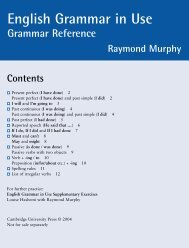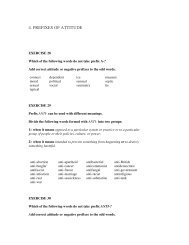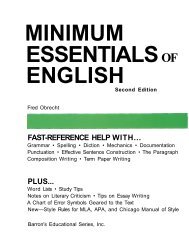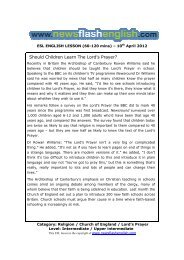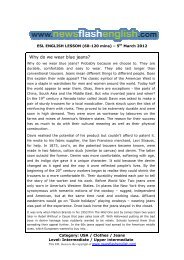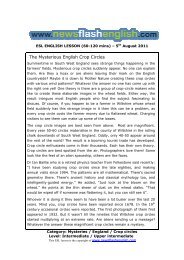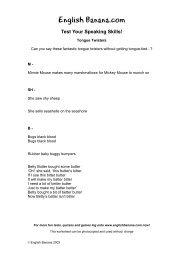A Grammar of the English Tongue - ESL Teachers Board
A Grammar of the English Tongue - ESL Teachers Board
A Grammar of the English Tongue - ESL Teachers Board
You also want an ePaper? Increase the reach of your titles
YUMPU automatically turns print PDFs into web optimized ePapers that Google loves.
A <strong>Grammar</strong> <strong>of</strong> <strong>the</strong> <strong>English</strong> <strong>Tongue</strong> 609. Trissyllables ending in ous, as grácious, árduous; in al, as cápital; in ion,as méntion; accent <strong>the</strong> first.10. Trissyllables ending in ce, ent, and ate, accent <strong>the</strong> first syllable, ascóuntenance, cóntinence, ármament, ímminent, élegant, própagate, except<strong>the</strong>y be derived from words having <strong>the</strong> accent on <strong>the</strong> last, as connívance,acquáintance; or <strong>the</strong> middle syllable hath a vowel before two consonants, aspromúlgate.11. Trissyllables ending in y, as éntity, spécify, líberty, víctory, súbsidy,commonly accent <strong>the</strong> first syllable.12. Trissyllables in re or le accent <strong>the</strong> first syllable, as légible, théatre,except discíple, and some words which have a position, as exámple, epístle.13. Trissyllables in ude commonly accent <strong>the</strong> first syllable, as plénitude.14. Trissyllables ending in ator or atour, as creátour; or having in <strong>the</strong>middle syllable a diphthong, as endeávour; or a vowel before twoconsonants, as doméstick; accent <strong>the</strong> middle syllable.15. Trissyllables that have <strong>the</strong>ir accent on <strong>the</strong> last syllable are commonlyFrench, as acquiésce, repartée, magazíne, or words formed by prefixing oneor two syllables to an acute syllable, as immatúre, overchárge.16. Polysyllables, or words <strong>of</strong> more than three syllables, follow <strong>the</strong> accent<strong>of</strong> <strong>the</strong> words from which <strong>the</strong>y are derived, as árrogating, cóntinency,incóntinently, comméndable, commúnicableness. We should <strong>the</strong>refore saydispútable, indispútable; ra<strong>the</strong>r than dísputable, indísputable; andadvertísement, ra<strong>the</strong>r than advértisement.17. Words in ion have <strong>the</strong> accent upon <strong>the</strong> antepenult, as salvátion,perturbátion, concóction; words in atour or ator on <strong>the</strong> penult, as dedicátor.18. Words ending in le commonly have <strong>the</strong> accent on <strong>the</strong> first syllable, asámicable, unless <strong>the</strong> second syllable have a vowel before two consonants,




